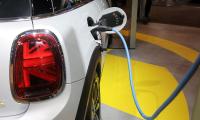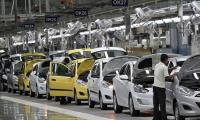Electric Auto-Rickshaw Retrofit: Fiscal Incentives Key to Transition
A new whitepaper outlines how fiscal incentives and streamlined processes can accelerate the transition to electric auto-rickshaws in India through retrofitting. Learn about the benefits and challenges.
Hyderabad, Jun 21 (PTI) By prioritising fiscal incentives, streamlining state processes, facilitating affordable financing and addressing regulatory challenges, India can accelerate the transition to electric vehicles in the auto-rickshaw segment, according to a whitepaper providing a blueprint on retrofitting ICE three-wheelers to electric.
Initiatives such as zero emission vehicle credits, fostering an insurance ecosystem, addressing infrastructure barriers, and promoting awareness among driver partners further contribute to creating an enabling environment for nationwide retrofitment adoption, the whitepaper released here on Friday said.
Through these coordinated efforts, India can effectively pave the way for a sustainable and electrified future for its three-wheeler fleet, significantly reducing emissions and operational costs while extending the lifespan of existing vehicles, according to the whitepaper 'Powering Progress A Blueprint for Retrofitting Three-Wheelers Internal Combustion Engine to Electric'.
The Natural Resources Defense Council (NRDC), Administrative Staff College of India (ASCI) and the International Copper Association of India released the whitepaper commissioned by the Telangana government.
The whitepaper includes an analysis of the electric three-wheeler retrofitment ecosystem and offers a blueprint for the widespread adoption of retrofitment technologies across the country.
The whitepaper was launched at a Workshop On Advancing Electrification of Passenger Auto rickshaws through Retrofitment Solutions: A Blueprint for Indian Cities' in the presence of Telangana Special Chief Secretary, Industries & Commerce, Jayesh Ranjan, NRDC India Country Head Dipa Singh Bagai and ASCI officials.
Currently, India has an extensive fleet size of 7.4 million passenger-autos which is expected to reach 11 million by 2030, the whitepaper said.
"The tailpipe emissions from auto rickshaws under best case operating conditions constitute nearly 10 per cent of the total road transport emissions in cities," it highlighted.
Despite the array of fiscal and non-fiscal incentives provided by both national and sub-national governments in India, the penetration rate of passenger electric auto-rickshaws remains low, standing at only 6.2 per cent, it said, adding that this sluggish adoption can be attributed to the high capital costs of new electric vehicles and lack of public awareness regarding cost-effective technologies to retrofit older vehicles to electric.
The whitepaper made several recommendations including on providing fiscal incentives to harness potential of retrofitment solutions and said implementation of these steps could help accelerate the adoption of retrofitment technologies in the three-wheeler segment.
On the benefits of retrofitment, the whitepaper said retrofitting has emerged as a viable solution to address the declining efficiency and increasing operational costs associated with aging vehicles, such as ICE auto-rickshaws.
"This technology extends the lifespan of these vehicles by an additional 5-7 years, resulting in direct reductions in resource consumption and carbon emissions," it further highlighted.
Electric vehicle retrofitting involves converting conventional petrol or diesel vehicles into electric ones by replacing the original engine with an electric powertrain.
Initiatives such as zero emission vehicle credits, fostering an insurance ecosystem, addressing infrastructure barriers, and promoting awareness among driver partners further contribute to creating an enabling environment for nationwide retrofitment adoption, the whitepaper released here on Friday said.
Through these coordinated efforts, India can effectively pave the way for a sustainable and electrified future for its three-wheeler fleet, significantly reducing emissions and operational costs while extending the lifespan of existing vehicles, according to the whitepaper 'Powering Progress A Blueprint for Retrofitting Three-Wheelers Internal Combustion Engine to Electric'.
The Natural Resources Defense Council (NRDC), Administrative Staff College of India (ASCI) and the International Copper Association of India released the whitepaper commissioned by the Telangana government.
The whitepaper includes an analysis of the electric three-wheeler retrofitment ecosystem and offers a blueprint for the widespread adoption of retrofitment technologies across the country.
The whitepaper was launched at a Workshop On Advancing Electrification of Passenger Auto rickshaws through Retrofitment Solutions: A Blueprint for Indian Cities' in the presence of Telangana Special Chief Secretary, Industries & Commerce, Jayesh Ranjan, NRDC India Country Head Dipa Singh Bagai and ASCI officials.
Currently, India has an extensive fleet size of 7.4 million passenger-autos which is expected to reach 11 million by 2030, the whitepaper said.
"The tailpipe emissions from auto rickshaws under best case operating conditions constitute nearly 10 per cent of the total road transport emissions in cities," it highlighted.
Despite the array of fiscal and non-fiscal incentives provided by both national and sub-national governments in India, the penetration rate of passenger electric auto-rickshaws remains low, standing at only 6.2 per cent, it said, adding that this sluggish adoption can be attributed to the high capital costs of new electric vehicles and lack of public awareness regarding cost-effective technologies to retrofit older vehicles to electric.
The whitepaper made several recommendations including on providing fiscal incentives to harness potential of retrofitment solutions and said implementation of these steps could help accelerate the adoption of retrofitment technologies in the three-wheeler segment.
On the benefits of retrofitment, the whitepaper said retrofitting has emerged as a viable solution to address the declining efficiency and increasing operational costs associated with aging vehicles, such as ICE auto-rickshaws.
"This technology extends the lifespan of these vehicles by an additional 5-7 years, resulting in direct reductions in resource consumption and carbon emissions," it further highlighted.
Electric vehicle retrofitting involves converting conventional petrol or diesel vehicles into electric ones by replacing the original engine with an electric powertrain.
You May Like To Read
TODAY'S MOST TRADED COMPANIES
- Company Name
- Price
- Volume
- Vodafone-Idea-L
- 11.65 (+ 3.56)
- 106772451
- Alstone-Textiles
- 0.28 ( -3.45)
- 44187760
- Mangalam-Industrial
- 0.88 ( -2.22)
- 39177573
- Sunshine-Capital
- 0.27 (+ 3.85)
- 35956340
- GMR-Airports
- 104.40 (+ 6.37)
- 30453005





